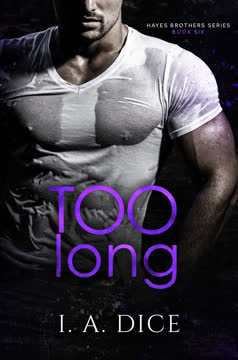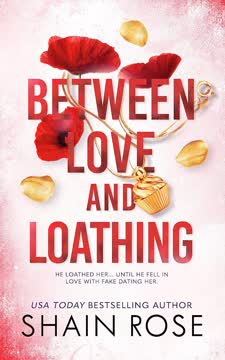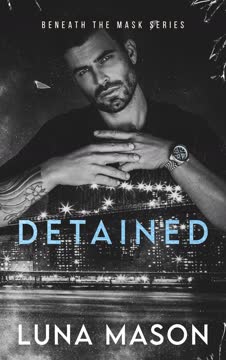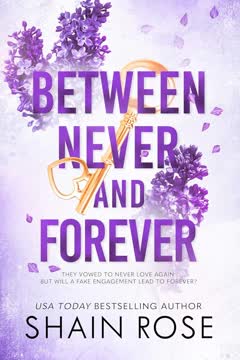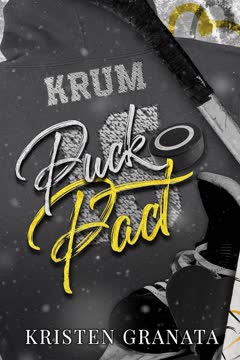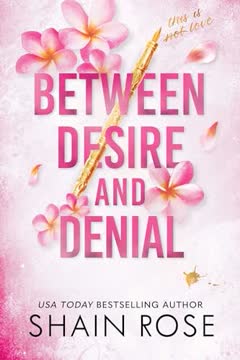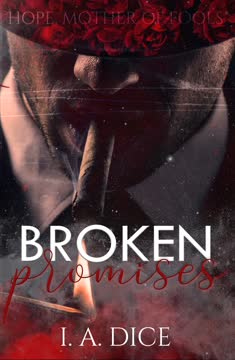Plot Summary
Midnight Desert Races
Colt Hayes, the youngest of seven siblings, finds his only solace in illegal midnight street races across the California desert. Despite his family's happiness and success, Colt feels like an outsider, the last single Hayes, haunted by a near-fatal crash that left him physically and emotionally scarred. Racing is his escape from the ache of loneliness and the pressure to find meaning in a life that seems to be passing him by. He donates his winnings to charity, but the thrill is fleeting, and the emptiness always returns.
The Last Single Hayes
Colt's family is large, loving, and loud, with every sibling paired off and building families of their own. Colt's sense of inadequacy grows as he watches engagement after engagement, baby after baby, feeling left behind. His brothers, Conor and Cody, stage an intervention, confronting him about his workaholic tendencies and secret racing. They push him to try speed dating, hoping to jolt him out of his rut and into the arms of someone who might finally make him happy.
Brothers' Intervention
Colt's brothers blackmail him into attending Express Dates, a speed-dating event, threatening to reveal his racing if he refuses. Reluctantly, Colt agrees, determined to get through the night with minimal effort. He's jaded by past failed attempts at finding love, but the intervention forces him to confront his own avoidance and the possibility that he might actually want more than just adrenaline and solitude.
Express Dates Roulette
At Express Dates, Colt endures a parade of uninspiring conversations until he meets Addie, a sharp, guarded British woman with her own agenda. Their banter is electric, both reading each other with uncanny accuracy. Addie is searching for a fake boyfriend to take on a family cruise, offering money for the role. Colt, amused and intrigued, is the only man who doesn't immediately try to impress her or take advantage. They part ways, but the connection lingers.
The Girl in Purple
Addie, desperate to avoid her mother's matchmaking and an unwanted proposal from her ex, Grant, needs a convincing boyfriend for her brother's engagement cruise. She's smart, independent, and wary of men's intentions, but Colt's authenticity and subtle dominance unsettle her. Their mutual attraction simmers beneath the surface, complicated by Addie's insistence on keeping things transactional and Colt's growing curiosity about her.
A Deal for Appearances
After a drunken night, Addie wakes up in Colt's guest room, mortified but safe. They strike a deal: Colt will pose as her boyfriend for the week-long Caribbean cruise, no strings attached, no sex, just a convincing act. They spend a day learning each other's histories, quirks, and family details, building a believable backstory. The lines between real and fake begin to blur as they discover how easy it is to be around each other.
Fake Romance, Real Chemistry
On the yacht, Colt and Addie navigate her wealthy, judgmental family, especially her mother, Victoria, who is determined to see Addie marry Grant. The charade is tested by family games, social events, and the arrival of Grant himself. Colt's protectiveness and Addie's vulnerability draw them closer, their chemistry intensifying with every shared secret and stolen glance. The act becomes harder to maintain as real emotions surface.
Family, Lies, and Yachts
The cruise is a gauntlet of family drama, competitive games, and social maneuvering. Addie's mother undermines Colt at every turn, while her father and brother warm to him. Addie's anxiety and fear of disappointing her family clash with her desire for independence. Colt, meanwhile, finds himself wanting more than just a week of pretending—he wants Addie for real, but both are haunted by the knowledge that their arrangement has an expiration date.
The Ex Arrives
Grant, Addie's ex and her mother's preferred suitor, arrives by helicopter, determined to win her back. His presence stirs jealousy and tension, pushing Colt to stake his claim and Addie to confront her past. A public altercation between Colt and Grant erupts, exposing the depth of Colt's feelings and Addie's need for someone who truly sees and values her. The fake relationship teeters on the edge of something real.
Games, Fears, and Fights
A series of competitive family games culminates in a terrifying moment when Addie, paralyzed by her fear of heights, is stranded on a rope bridge. Colt talks her across, revealing his unwavering support and care. The ordeal strips away their defenses, forcing them to acknowledge the depth of their connection. That night, they finally give in to their desire, crossing the line from pretend to real in a night of passion and intimacy.
Lines Crossed, Hearts Exposed
As the cruise ends, Colt and Addie are forced to confront the reality of their differences. Addie, shaped by her mother's example, is wary of marriage and children, determined to live life on her own terms. Colt, longing for a family of his own, realizes their dreams may be incompatible. A painful conversation exposes their fears and hopes, leading to a tearful goodbye in Miami as they part ways, both heartbroken but unwilling to ask the other to change.
The Bridge and the Breakdown
Back in California, Colt throws himself into work and racing, but nothing fills the void left by Addie. He realizes that the thrill of the race no longer satisfies him; the only thing he truly wants is the woman he let go. Addie, meanwhile, returns to her life, haunted by memories of Colt and the possibility that she may have let happiness slip through her fingers out of fear.
Goodbye in Miami
Their parting in Miami is raw and unresolved, both struggling to articulate what they mean to each other. The pain of goodbye lingers, each believing they are doing the right thing by not asking the other to compromise. The story seems to end with two people who found something extraordinary, only to lose it to timing and circumstance.
Racing Toward Emptiness
Colt returns to the desert races, seeking the old rush, but is overcome by fear for the first time. He realizes that risking his life is no longer an option now that he knows what real love feels like. The emptiness is unbearable, and he finally admits to himself that he cannot move on without Addie.
The Realization
Colt's brothers confront him, urging him to fight for what he wants. He finally understands that happiness doesn't always look the way you expect, and that love is worth the risk of compromise. He races to find Addie, determined to tell her the truth and see if there is still a chance for them.
Reunion on the Porch
Colt finds Addie waiting on his porch, both of them unable to stay away. They confess their love, acknowledging their fears and the ways they've changed each other. Addie admits she wants a future with Colt, even if it means reimagining what happiness looks like. They agree to build a life together, on their own terms, blending dreams and realities.
Happily Ever After, Redefined
Colt and Addie marry, not in haste but with intention, surrounded by family and friends. They build a home, support each other's ambitions, and eventually welcome a child. Their story is not about perfection, but about choosing each other every day, embracing the messiness of love, and finding joy in the unexpected. The Hayes family grows, and Colt finally finds the belonging and purpose he's been searching for.
Characters
Colt Hayes
Colt is the youngest of seven siblings, defined by his sense of isolation within a loving but overwhelming family. Scarred by a near-fatal racing accident, he seeks adrenaline to fill the void left by loneliness and unmet expectations. Colt is fiercely loyal, generous, and protective, but struggles with vulnerability and the fear of never finding his place. His journey is one of self-discovery, learning to let go of old coping mechanisms and open himself to real connection. Through Addie, he confronts his deepest fears and learns that happiness is not about fitting a mold, but about embracing the messiness of love.
Addie (Audrey) Weston
Addie is a British transplant from a wealthy, high-expectation family, determined to forge her own path as a veterinary student. Scarred by her mother's controlling ways and a history of being treated as a trophy, Addie is wary of commitment and fiercely protective of her independence. She is sharp, witty, and deeply compassionate, especially toward animals. Her journey is about learning to trust, to accept love without losing herself, and to redefine what family and partnership mean on her own terms.
Victoria Weston
Addie's mother is the embodiment of old-money expectations, determined to see her daughter married to a suitable (wealthy) man. She is critical, manipulative, and dismissive of Addie's dreams, using guilt and social pressure to get her way. Her relationship with Addie is fraught, serving as both a cautionary tale and a catalyst for Addie's rebellion.
Henry Weston
Addie's father is a counterbalance to Victoria, offering warmth and understanding. He sees through Addie's deceptions but supports her choices, valuing her happiness over appearances. His acceptance of Colt is a turning point, signaling that love can be both unconditional and freeing.
Grant Whitaker
Grant is Addie's ex and her mother's preferred suitor, representing everything Addie wants to escape: control, expectation, and a lack of genuine connection. His arrival on the cruise stirs jealousy and conflict, forcing Addie and Colt to confront their feelings and the authenticity of their relationship.
Conor and Cody Hayes
Colt's brothers are both his tormentors and his saviors, pushing him out of his comfort zone and into the possibility of love. Their interventions are both comic and heartfelt, reflecting the deep bonds of the Hayes family and the ways in which siblings can both wound and heal.
The Hayes Siblings
The extended Hayes family serves as both a source of pressure and a model of what real, messy, enduring love looks like. Their happiness is both a burden and an inspiration for Colt, ultimately showing him that family is not about perfection, but about showing up for each other.
Amara
Addie's soon-to-be sister-in-law, Amara is the architect of the cruise's endless games and bonding exercises. Her relentless optimism and focus on appearances provide both comic relief and a foil for Addie's more cynical view of family.
Curly
Curly is Colt's connection to the world of street racing, a constant presence who both enables and grounds Colt's need for escape. He represents the allure and danger of Colt's old life, and his acceptance of Addie signals Colt's movement toward something new.
The Hayes Brothers (Nico, Logan, Theo, Shawn)
Each brother represents a different path to happiness, offering advice, tough love, and a reminder that there is no single way to build a life. Their presence is a constant in Colt's journey, challenging him to confront his fears and embrace change.
Plot Devices
Dual Narration and Alternating Perspectives
The novel alternates between Colt and Addie's perspectives, allowing readers to experience the same events through different emotional lenses. This device deepens the psychological complexity, highlighting misunderstandings, internal conflicts, and the slow unraveling of defenses. It also creates dramatic irony, as readers are privy to both characters' fears and desires, even when they are not honest with each other.
The Fake Relationship Trope
The central plot device is the classic "fake dating" arrangement, which forces two guarded individuals into close proximity and emotional vulnerability. The pretense allows them to bypass the usual barriers to intimacy, but also raises the stakes when real feelings emerge. The device is used to explore themes of authenticity, trust, and the blurry line between acting and being.
Family as Both Obstacle and Sanctuary
Both Colt and Addie are shaped by their families—one by abundance and expectation, the other by control and conditional love. Family gatherings, games, and interventions serve as crucibles for character development, forcing both protagonists to confront their fears and redefine what family means.
Symbolism of Racing and the Bridge
Colt's racing is a metaphor for his avoidance of vulnerability and his search for meaning. The bridge scene, where Addie must cross despite her terror, symbolizes the leap of faith required to move from fear to trust, from isolation to connection. Both characters must risk everything to find happiness.
Foreshadowing and Repetition
The novel uses foreshadowing—Colt's accident, Addie's repeated insistence on not wanting marriage—to build tension and highlight the stakes. Repetition of key phrases ("I don't want to get married," "You're not a stranger") underscores the characters' internal battles and the gradual shift in their beliefs.
The "Click" and the Redefinition of Happiness
Throughout the story, characters reference the idea of "the click"—the moment you know you've found your person. The novel ultimately subverts this, showing that happiness is not about perfection or instant certainty, but about choosing each other, working through differences, and building something real.
Analysis
Too Long is a contemporary romance that uses the familiar "fake dating" trope to explore deeper themes of loneliness, family expectation, and the courage required to build an authentic life. Through the dual journeys of Colt and Addie, the novel interrogates the myths we inherit about love, happiness, and success, showing how the pursuit of perfection can leave us isolated and unfulfilled. The story's strength lies in its psychological realism: both protagonists are deeply flawed, shaped by trauma and fear, but willing to risk vulnerability for the chance at something real. The narrative structure—alternating perspectives, family as both obstacle and support, and the use of physical risk as metaphor—creates a rich tapestry of emotion and insight. Ultimately, Too Long is a story about redefining what it means to belong, to love, and to be happy—not by following a script, but by writing your own. The lesson is clear: happiness is not about having it all, but about choosing, every day, to show up for yourself and the people you love, even when it's hard.
Last updated:
FAQ
Synopsis & Basic Details
What is Too Long about?
- A Lonely Racer's Quest: Too Long follows Colt Hayes, the youngest of seven brothers, who secretly races cars to escape profound loneliness and the pressure to find a partner amidst his family's thriving relationships. His life is marked by a near-fatal accident that reshaped his priorities, pushing him to seek genuine connection.
- A Wary Student's Deception: Addie Weston, a sharp and independent British veterinary student from a wealthy, controlling family, needs a fake boyfriend for a week-long Caribbean cruise to deter her mother's matchmaking and an unwanted proposal from her ex, Grant.
- Fake Relationship Trope: Blackmailed by his brothers into speed dating, Colt meets Addie, and they strike a deal. What begins as a transactional arrangement to navigate family expectations quickly evolves into a passionate, emotionally charged journey where their carefully constructed defenses crumble, forcing them to confront their deepest fears and desires.
Why should I read Too Long?
- Deep Emotional Resonance: Readers seeking a romance that delves beyond surface-level attraction will appreciate Colt's profound struggle with loneliness and Addie's fight for autonomy. The story explores how past traumas shape present desires, making their eventual connection incredibly earned and impactful.
- Dynamic Character Arcs: Witness Colt's transformation from a thrill-seeking loner to a man willing to abandon his escape for love, and Addie's journey from guarded independence to embracing vulnerability and redefining her vision of happiness. Their growth is compelling and relatable.
- Rich Family as Both Obstacle and Sanctuary: The Hayes brothers' meddling, combined with the Westons' high-society drama, provides both comedic relief and significant thematic depth. The interplay between these contrasting family worlds adds layers of conflict and warmth, making the narrative engaging and multifaceted.
What is the background of Too Long?
- Part of a Larger Universe: Too Long is the sixth installment in the "Hayes Brothers Series," building on the established dynamics and interconnected lives of Colt's large, close-knit family. This context enriches the narrative, as readers understand the history and personalities of his siblings, who play significant supporting roles.
- Cultural & Socioeconomic Contrast: The story highlights a fascinating clash between Addie's old-money British family, with its rigid expectations and emphasis on status, and Colt's more grounded, American family, which values loyalty and emotional connection. This contrast underscores Addie's internal conflict and Colt's initial perception as an "outsider."
- Subculture of Street Racing: Colt's secret life in illegal desert street races provides a gritty, high-stakes backdrop to his emotional journey. This subculture, with its adrenaline, camaraderie, and danger, serves as a powerful metaphor for Colt's internal turmoil and his search for meaning beyond conventional life.
What are the most memorable quotes in Too Long?
- "My life doesn't have the same sweet taste my brothers get to savor, and in this slow-motion descent into death, I realize I haven't truly lived." (Colt, Prologue): This quote powerfully encapsulates Colt's profound sense of unfulfillment and loneliness, revealing the existential dread that drives his reckless behavior and his desperate search for purpose. It sets the stage for his emotional vulnerability and desire for a meaningful life.
- "You're perfect. You smell like roses in spring rain, peaches, and sugar. You're smart, beautiful, funny, and I can't get enough of how absolutely fucking infuriating and nosey you are." (Colt to Addie, Chapter 18): This passionate declaration from Colt is a pivotal moment, breaking through Addie's insecurities and revealing the depth of his attraction and affection. It highlights his ability to see and appreciate all facets of her personality, including her "infuriating" quirks, which is a stark contrast to how her family often perceives her.
- "Happiness doesn't always look like we've imagined." (Colt, Chapter 31): This profound realization marks Colt's ultimate transformation. After abandoning his race, he understands that his rigid vision of happiness (marriage, kids, a specific timeline) was blinding him to the unique, unconventional love he found with Addie. It's a powerful statement about embracing unexpected paths and redefining personal fulfillment.
What writing style, narrative choices, and literary techniques does I.A. Dice use?
- Dual Narration and Alternating Perspectives: I.A. Dice employs alternating first-person perspectives for Colt and Addie, immersing readers deeply in their individual thoughts and emotional struggles. This technique, rich with internal monologues, allows for a nuanced exploration of their insecurities, desires, and the often-miscommunicated subtext of their interactions, enhancing the psychological realism.
- Sensory-Rich & Visceral Language: The author uses vivid, sensory descriptions, particularly in action sequences like racing and intimate moments, to create an immersive experience. Phrases like "taste the gasoline and the metallic tang of adrenaline" or "liquid heat fills my chest" draw readers into the characters' physical and emotional states, making their experiences palpable.
- Dialogue-Driven Pacing & British Slang: The narrative is propelled by sharp, witty dialogue, especially between Colt and Addie, which often carries significant subtext and reveals character. Addie's use of British slang ("daft git," "knobhead," "bellend") adds a unique flavor to her voice, highlighting her cultural background and providing moments of unexpected humor and endearment.
Hidden Details & Subtle Connections
What are some minor details that add significant meaning?
- Colt's Charity Donations: The prologue reveals Colt donates his racing winnings to "homeless shelters, and animal rescue centers." This subtle detail immediately establishes his inherent goodness and generosity, contrasting with the reckless image of a street racer and foreshadowing his deep compassion, especially towards animals, which later aligns perfectly with Addie's passion. This detail is crucial for understanding his character beyond the surface.
- Addie's Pet Pig, Emmanuel: Addie's casual mention of her pet pig, Emmanuel, and other rescued animals, initially seems like a quirky character trait. However, it becomes a powerful symbol of her nurturing nature and her defiance against her mother's expectations. Colt's later gesture of retrieving Jasper, her emu, is a direct callback to this, demonstrating his understanding and acceptance of her unique passions, a stark contrast to Grant's dismissiveness.
- The "Diode" Camera: Addie's paranoia about a "tiny diode" in a wireless charger being a hidden camera in their yacht suite, despite Colt's logical dismissal, subtly highlights her deep-seated distrust and the constant surveillance she feels under from her controlling mother. This detail underscores her need for privacy and autonomy, revealing the psychological impact of her upbringing.
What are some subtle foreshadowing and callbacks?
- Colt's Near-Death Experience & Emptiness: The prologue vividly describes Colt's near-fatal crash and his realization that he "haven't truly lived," feeling "empty" despite his family's happiness. This foreshadows his later emotional breakdown when he believes he's lost Addie, as he returns to racing but finds it now amplifies his emptiness, directly recalling his initial feelings of unfulfillment.
- Addie's "No Kids" Statement: Early in the story, Addie emphatically states, "I don't want to get married. I don't want kids!" This seemingly definitive statement is a crucial piece of foreshadowing for the central conflict that drives Colt away. The eventual resolution, where she re-evaluates this stance, highlights her growth and the transformative power of her relationship with Colt.
- The "Pig-Headed Nutter" Insult: Addie's playful British insults, like calling Colt a "pig-headed nutter" during their treasure hunt, are initially lighthearted. However, this specific phrase subtly foreshadows Grant's later attempt to mock Addie by referencing her pet pig, Emmanuel, and calling her "Audrey the ostrich." Colt's immediate defense of Addie and her animals demonstrates his deep respect for her, contrasting sharply with Grant's condescension.
What are some unexpected character connections?
- Kaya Addams, Nico's Ex, as Addie's Neighbor: The revelation that Addie's new neighbor is Kaya Addams, Nico Hayes's "bat-shit crazy, an alcoholic and a cheater" ex-girlfriend, is an unexpected link between the two families. This connection not only provides Addie with crucial (and biased) information about Colt's family but also subtly highlights the Hayes brothers' past struggles and their protective nature, adding depth to their collective history.
- Henry Weston's Poker Games with Colt: Addie's father, Henry, quickly bonds with Colt over poker, inviting him to play nightly. This seemingly innocuous detail is significant because Henry is a shrewd judge of character, and his acceptance of Colt, despite his initial "charity case" status in Victoria's eyes, signals his approval and trust. It's an unexpected alliance that subtly undermines Victoria's attempts to control Addie's choices.
- Colt's Brothers' "Betting" on His Love Life: The Hayes brothers' long-standing tradition of betting on each other's romantic lives, particularly on "how long it'll take before fake dating becomes real dating" for Colt and Addie, reveals a deeper layer of their protective and invested nature. This playful yet serious connection underscores their desire for Colt to find happiness, making their interventions more endearing than annoying.
Who are the most significant supporting characters?
- Henry Weston: The Quiet Enabler: Addie's father, Henry, is far more significant than a mere supportive parent. He subtly enables Addie's rebellion against Victoria, offering Colt genuine acceptance and even sharing family secrets. His pragmatic nature and keen judgment of character provide a crucial counterpoint to Victoria's snobbery, validating Colt's worth and indirectly fostering Addie's trust in him.
- Curly: The Unofficial Confidant: Curly, the organizer of the desert races, serves as Colt's primary confidant and a grounding force in his reckless world. He's not just a facilitator of Colt's escape but also an observant friend who notices Colt's emotional state and Addie's absence, subtly pushing Colt towards confronting his feelings. He represents the raw, authentic side of Colt's life that Addie eventually embraces.
- Amara: The Catalyst for Chaos: Addie's future sister-in-law, Amara, is more than just the "orchestrator of chaos" with her elaborate games. Her relentless pursuit of a perfect, high-society engagement celebration inadvertently creates the high-pressure environment that forces Addie and Colt to confront their feelings, test their boundaries, and ultimately solidify their bond amidst the manufactured drama.
Psychological, Emotional, & Relational Analysis
What are some unspoken motivations of the characters?
- Colt's Desperate Search for "The Click": Beneath Colt's outward confidence and thrill-seeking, his unspoken motivation is a profound fear of being perpetually alone. His brothers' happiness and families amplify his loneliness, driving him to desperately seek "the click"—the instant, undeniable connection they describe—even if it means ignoring red flags or rushing into feelings, as seen in his rapid attachment to Addie.
- Addie's Fear of Becoming a "Trophy Wife": Addie's strong aversion to marriage and children, initially presented as a desire for independence, is deeply rooted in her unspoken fear of becoming like her mother, Victoria—a "trophy wife" whose dreams and opinions are suppressed. Her drive for a career and animal rescue is a direct rebellion against this perceived fate, making her eventual acceptance of marriage a significant psychological breakthrough.
- Victoria's Need for Control & Validation: Victoria Weston's relentless meddling and insistence on Addie marrying Grant stem from an unspoken need for control and social validation. Her own life, as revealed by Henry, was one of compromise and suppressed dreams, leading her to project her unfulfilled desires onto Addie, believing a "suitable" marriage is the only path to happiness and maintaining her family's elite status.
What psychological complexities do the characters exhibit?
- Colt's Trauma-Induced Desperation: Colt exhibits complex post-traumatic responses to his near-fatal accident. His initial racing was an escape, but after dying for four minutes, it became a desperate search for meaning and connection. This trauma fuels his intense desire for a family, leading to an almost obsessive attachment to Addie, which he struggles to reconcile with his fear of disappointment, creating internal conflict.
- Addie's Defensive Independence: Addie's fierce independence and guarded nature are psychological defense mechanisms developed to protect herself from her mother's control and past emotional wounds (like Grant's betrayal). Her initial "transactional" approach to relationships and her reluctance to fully commit are manifestations of this, making her eventual vulnerability and trust in Colt a significant psychological hurdle.
- Grant's Entitlement & Insecurity: Grant Whitaker, despite his wealth and polished exterior, displays deep psychological insecurity masked by entitlement and arrogance. His persistent pursuit of Addie, even after her repeated rejections and his past infidelity, suggests a need for validation and a desire to secure his social standing through her family's fortune, rather than genuine affection.
What are the major emotional turning points?
- Colt's Fear on the Rope Bridge: The most significant emotional turning point for Colt occurs when Addie is stranded on the rope bridge. His internal monologue reveals profound fear ("I couldn't risk walking across to you, but if you fell... I'd have followed"), a stark contrast to his usual fearlessness in racing. This moment solidifies his love and protective instincts, shifting his priorities from self-preservation to Addie's safety.
- Addie's Realization of Colt's Intentions: Addie's emotional turning point happens when she confronts Colt about his reluctance to kiss her, leading to his raw confession: "Because if I do, if I get a taste of your lips, I won't stop until I know what every inch of you tastes like." This intense honesty, coupled with his dominant yet caring demeanor, shatters her defenses and allows her to embrace their physical and emotional connection, moving beyond her "no sex" rule.
- Colt's Abandonment of the Race: Colt's decision to abandon his final desert race, feeling "afraid" for the first time, marks his ultimate emotional transformation. This act symbolizes his letting go of his old coping mechanism and embracing a future with Addie, even if it means redefining his long-held dreams. It's a powerful moment of self-discovery, prioritizing love over adrenaline.
How do relationship dynamics evolve?
- From Transactional to Intimate Partnership: The relationship between Colt and Addie evolves from a purely transactional "fake boyfriend" arrangement to a deeply intimate and committed partnership. Initially, Addie offers money for Colt's time, but their shared vulnerability, mutual respect, and undeniable chemistry quickly blur these lines, culminating in a passionate physical and emotional bond.
- Dominance and Submission in Intimacy: A key evolution in their dynamic is the exploration of dominance and submission in their intimate relationship. Colt's inherent territoriality and Addie's surprising responsiveness to his commanding nature ("Good girl," "Do as you're told") create a powerful, consensual dynamic that deepens their connection and allows Addie to explore a side of herself she never knew existed.
- Family as Both Obstacle and Sanctuary: The relationship's evolution is also marked by their integration into each other's families. While Victoria initially resists, Henry and the Hayes brothers quickly accept Addie. Colt's eventual acceptance by Victoria, and Addie's embrace of the Hayes family chaos, signifies their journey from isolated individuals to a couple supported by a wider, loving network, redefining what "family" means for both.
Interpretation & Debate
Which parts of the story remain ambiguous or open-ended?
- The Long-Term Impact of Victoria's Influence: While Victoria Weston eventually accepts Colt and Addie's relationship, the long-term psychological impact of her controlling and critical nature on Addie remains somewhat ambiguous. Readers might debate how Addie will continue to navigate her mother's influence, especially as she builds her own family and career, and whether Victoria's "acceptance" is truly genuine or merely a strategic concession.
- The Future of Addie's Career vs. Family: Addie's initial strong stance against marriage and kids, driven by her ambition to open a veterinary clinic and travel, is significantly altered by her love for Colt and unexpected pregnancy. The story ends with a promise that Colt will support her dreams, but the practicalities of balancing a demanding career, a new clinic, and raising a child remain open-ended, inviting readers to consider the compromises and challenges ahead.
- The Speed of Their Commitment: The rapid pace of Colt and Addie's relationship, culminating in an engagement and pregnancy within weeks of meeting, might be seen as ambiguous by some readers. While the narrative attributes this to "fate" and undeniable chemistry, it leaves room for debate on whether such a swift commitment is truly sustainable or if it reflects Colt's underlying desperation for a family, potentially glossing over deeper compatibility issues.
What are some debatable, controversial scenes or moments in Too Long?
- Colt's Dominant Behavior in Intimacy: Colt's explicit use of dominance, including gripping Addie's throat, giving commands like "On. Your. Knees. Right now," and the implied "punishment" for acting out, could be controversial. While presented as consensual and arousing for Addie, some readers might debate the power dynamics and whether such scenes align with healthy relationship portrayals, especially given their nascent connection.
- The Fight with Grant: The physical altercation between Colt and Grant at the bonfire, where Colt deliberately provokes Grant and then brutally retaliates, could be seen as controversial. While it serves to protect Addie and establish Colt's territorial nature, some might question the justification of violence and whether it's an appropriate response, even against a character as unlikable as Grant.
- Addie's Initial "Transactional" Approach to Relationships: Addie's willingness to "buy a boyfriend" for a week, offering "fifteen grand" for a purely transactional relationship, might be a debatable moment. It highlights her cynicism and past hurts but could be seen by some as objectifying or devaluing genuine connection, raising questions about her initial moral compass.
Too Long Ending Explained: How It Ends & What It Means
- Redefining Happiness and Family: The ending of Too Long sees Colt and Addie not only confessing their love but also embracing a future together that redefines their individual notions of happiness and family. Colt abandons his reckless racing and rigid timeline for marriage and children, realizing that "happiness doesn't always look like we've imagined." Addie, initially wary of commitment, chooses to marry Colt and, unexpectedly, becomes pregnant, finding joy in a future she once resisted.
- Compromise and Mutual Support: The story concludes with a powerful
Review Summary
Too Long is the final book in the Hayes Brothers series, following Colt and Audrey's fake dating romance. Readers praise the chemistry, spice, and emotional depth of the characters. Many appreciate the satisfying conclusion to the series, though some found the ending rushed. The fake dating trope and Colt's character development were particularly well-received. While most reviews are overwhelmingly positive, a few criticize the short timeframe of the relationship. Overall, fans express sadness at the series ending but satisfaction with the finale.
Hayes Brothers Series
Similar Books
Download PDF
Download EPUB
.epub digital book format is ideal for reading ebooks on phones, tablets, and e-readers.
